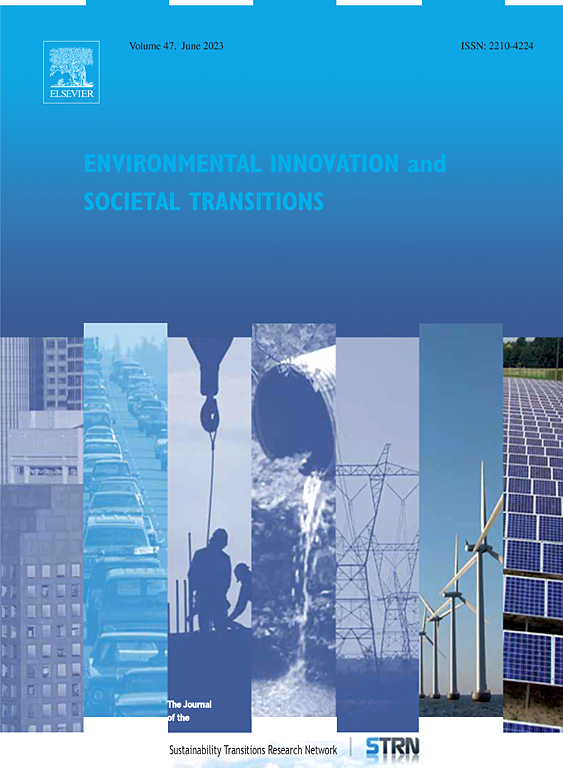Advertising restrictions and sustainability transitions: does banning advertising of harmful products induce innovation in benign alternatives?
IF 6.1
2区 经济学
Q1 ENVIRONMENTAL SCIENCES
Environmental Innovation and Societal Transitions
Pub Date : 2025-04-25
DOI:10.1016/j.eist.2025.101000
引用次数: 0
Abstract
Environmental activists increasingly seek to ban advertising of polluting products. Advertising bans (of tobacco and alcohol for example) have been widely used in support of public health objectives, but such bans have received little attention from environmental policy or sustainability transition scholars.
Sustainability transition studies have noted that advertising contributes to the durability of socio-technical regimes, which suggests advert bans can be seen as attempts at regime destabilisation. In this paper, we focus attention on the potential for advertising bans to influence product innovation incentives, and thus establish niches for sustainable innovations. We use a case study of the Norwegian beer market, using low/zero-alcohol beer as an analogy for sustainable innovation. We show that restricting advertising of a harmful product can stimulate innovation in a benign alternative. We conclude that carefully designed advertising bans could be a useful part of the policy toolbox for stimulating sustainable innovation.
广告限制和可持续性转变:禁止有害产品的广告会导致良性替代品的创新吗?
环保人士越来越多地寻求禁止污染产品的广告。广告禁令(例如烟草和酒精)已被广泛用于支持公共卫生目标,但这种禁令很少受到环境政策或可持续性转型学者的关注。可持续性转型研究指出,广告有助于社会技术制度的持久性,这表明广告禁令可以被视为破坏政权稳定的企图。在本文中,我们将重点关注广告禁令对产品创新激励的潜在影响,从而建立可持续创新的利基。我们以挪威啤酒市场为例,用低酒精/零酒精啤酒作为可持续创新的类比。我们表明,限制有害产品的广告可以刺激良性替代品的创新。我们得出的结论是,精心设计的广告禁令可能是刺激可持续创新的政策工具箱中有用的一部分。
本文章由计算机程序翻译,如有差异,请以英文原文为准。
求助全文
约1分钟内获得全文
求助全文
来源期刊

Environmental Innovation and Societal Transitions
Energy-Renewable Energy, Sustainability and the Environment
CiteScore
13.60
自引率
19.40%
发文量
90
审稿时长
56 days
期刊介绍:
Environmental Innovation and Societal Transitions serves as a platform for reporting studies on innovations and socio-economic transitions aimed at fostering an environmentally sustainable economy, thereby addressing structural resource scarcity and environmental challenges, particularly those associated with fossil energy use and climate change. The journal focuses on various forms of innovation, including technological, organizational, economic, institutional, and political, as well as economy-wide and sectoral changes in areas such as energy, transport, agriculture, and water management. It endeavors to tackle complex questions concerning social, economic, behavioral-psychological, and political barriers and opportunities, along with their intricate interactions. With a multidisciplinary approach and methodological openness, the journal welcomes contributions from a wide array of disciplines within the social, environmental, and innovation sciences.
 求助内容:
求助内容: 应助结果提醒方式:
应助结果提醒方式:


